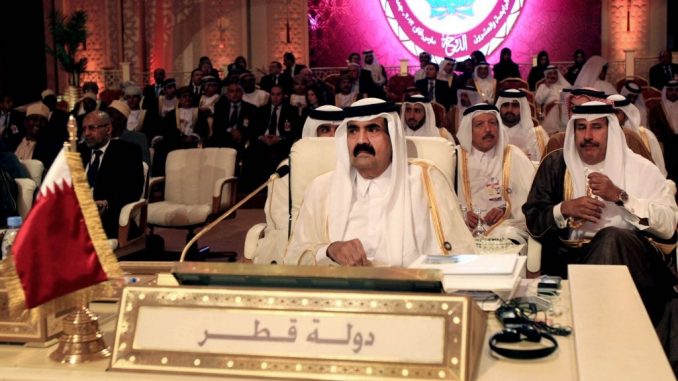
Bahrain, Saudi Arabia, UAE, Egypt, and Yemen have cut diplomatic ties with Qatar, kicking them out of the coalition, claiming that the country supports ISIS.
In response to the bold move, Qatar’s stock market suffered its largest drop in a decade, with Saudi Arabia closing the border and halting all air and sea traffic with Qatar, urging “all brotherly countries and companies to do the same“.

BYPASS THE CENSORS
Sign up to get unfiltered news delivered straight to your inbox.
You can unsubscribe any time. By subscribing you agree to our Terms of Use
Latest Video
Digitallook.com reports:
The official Saudi state news agency said early on Monday that diplomatic and consular relations had been severed with Qatar “proceeding from the exercise of its sovereign right guaranteed by international law and the protection of national security from the dangers of terrorism and extremism”, thought to be over its support for Islamist movements such as the Muslim Brotherhood and Hamas as well as its relationship with Iran.
Qatar may be a small state but the proceeds of being number one global producer of liquefied gas means its huge sovereign wealth fund wields much weight around the world, from the UK’s Barclays to Russia’s Rosneft. Qatar is also home to some 10,000 American troops based at the al-Udeid air base, the US military’s regional command centre.
Saudi, UAE and Bahrain on Monday gave Qatari visitors and residents two weeks to leave, Reutersreported, while several airlines including Emirates Airlines, UAE-based Flydubai and Abu Dhabi-based Etihad Airways said they would be suspending all Doha flights from Tuesday.
Saudi Arabia also pulled all Qatari troops from the coalition fighting the ongoing war in Yemen.
Qatar’s foreign ministry said it regretted the measures by its fellow Arab nations, calling the decisions “unjustified”.
“The measures are unjustified and are based on claims and allegations that have no basis in fact,” the ministry said.
“The aim is clear, and it is to impose guardianship on the state. This by itself is a violation of its [Qatar’s] sovereignty as a state,” it said, adding that it is committed to the Charter of the Gulf Cooperation Council.
Last month Saudi Arabia and the UAE blocked the Qatari websites, which include the al-Jazeera news network, after reports emerged from Qatar’s state run news agency of Qatari emir Sheikh Tamim bin Hamad al-Thani criticising Donald Trump, praising Iran and threatening to withdraw ambassadors from a range of Middle Eastern countries including Saudi Arabia.
Qatar protested that it was the victim of a sophisticated propaganda assault or cyber attack.
US connection
Speaking from a state visit in Australia on Monday, US Secretary of State Rex Tillerson said it was important that the GCC “remain united” and said he “would encourage the parties to sit down together and address these differences”.
Tillerson said despite the spat, he did not expect it to have “any significant impact, if any impact at all, on the unified fight against terrorism in the region or globally”.
Further stirring the pot, Wikileaks released an email from Hillary Clinton to John Podesta that revealed the former Secretary of State knew about both Saudi and Qatari governments providing “clandestine financial and logistical support” for Islamic State and other radical groups by August 2014.
Brent crude prices were initially helped by the news of the political crisis but by midday were down slightly at just under £50.
According to a Clinton email released by WikiLeaks in 2014, Hillary admitted she knew that the Saudi and Qatar government funded ISIL (ISIS):
Armed with proper equipment, and working with U.S. advisors, the Peshmerga can attack the ISIL with a coordinated assault supported from the air.
This effort will come as a surprise to the ISIL, whose leaders believe we will always stop with targeted bombing, and weaken them both in Iraq and inside of Syria.
At the same time we should return to plans to provide the FSA, or some group of moderate forces, with equipment that will allow them to deal with a weakened ISIL, and stepped up operations against the Syrian regime.
This entire effort should be done with a low profile, avoiding the massive traditional military operations that are at best temporary solutions.
While this military/para-military operation is moving forward, we need to use our diplomatic and more traditional intelligence assets to bring pressure on the governments of Qatar and Saudi Arabia, which are providing clandestine financial and logistic support to ISIL and other radical Sunni groups in the region.
This effort will be enhanced by the stepped up commitment in the KRG. The Qataris and Saudis will be put in a position of balancing policy between their ongoing competition to dominate the Sunni world and the consequences of serious U.S. pressure.
By the same token, the threat of similar, realistic U.S. operations will serve to assist moderate forces in Libya, Lebanon, and even Jordan, where insurgents are increasingly fascinated by the ISIL success in Iraq.”


